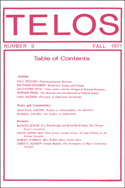Adam Smith is usually remembered as a champion of commerce. But as a moral philosopher he understood that even as commerce inculcates the virtues of industry, frugality, and temperance, it also inculcates vices such as avarice, envy, and short-sighted self-centeredness. Smith recognized that good government requires virtues such as honor, moral rectitude, patriotism, magnanimity, and a far-sighted perspective, to which the commercial vices are fairly opposed. Smith considered this a problem in his own day, as Great Britain was threatening to become a nation of shopkeepers, ruled by classes trained not in statesmanship but in commerce, governed not by codes of honor but by self-interest. The problem has resonance today as well.
|
As an occasional feature on TELOSscope, we highlight a past Telos article whose critical insights continue to illuminate our thinking and challenge our assumptions. Today, Frederick H. Pitts looks at Salvatore Veca’s “Value, Labor, and the Critique of Political Economy” from Telos 9 (Fall 1971). Capital is dead labor which, vampire-like, lives only by sucking living labor, and lives the more, the more labor it sucks. Starting from the analysis of the typical character of labor, it is possible to reconstruct towards the surface of the system the progressive stratifications and determinations of a totality which must, however, be traced back to its base, i.e., to that unequal exchange which contaminates the world of commodities and which reveals the class violence, the elementary mechanism of exploitation, and the dominance of dead labor over living labor. Veca presents the same temporal picture of past and present labor that moved Marx to crisscross Capital with a metaphorical cast of ghostly manifestations, vampires, and the undead. Veca’s paper suggests the extent to which Marx’s range of metaphors is no mere literary conceit, but rather it is a key feature of fundamental theoretical nodes in his critique of political economy. As we shall see, the specter of dead labor has deeper conceptual foundations in Marx’s forerunners, but this idea also has contemporary relevance with reference to present-day philosophical trends. |
||||
|
Telos Press Publishing · PO Box 811 · Candor, NY 13743 · Phone: 212-228-6479 Privacy Policy · Data Protection Copyright © 2025 Telos Press Publishing · All Rights Reserved |
||||
 Salvatore Veca’s 1971 essay “Value, Labor, and the Critique of Political Economy” summarizes the treatment of contained and required labor in Adam Smith, David Ricardo, and Karl Marx. Most interesting is the manner in which Veca temporalizes this distinction in political economy. He draws our attention to the opposition between past labor and present, dead labor and living; namely, “the dominance of past, materialized, accumulated labor over immediate, living labor”:
Salvatore Veca’s 1971 essay “Value, Labor, and the Critique of Political Economy” summarizes the treatment of contained and required labor in Adam Smith, David Ricardo, and Karl Marx. Most interesting is the manner in which Veca temporalizes this distinction in political economy. He draws our attention to the opposition between past labor and present, dead labor and living; namely, “the dominance of past, materialized, accumulated labor over immediate, living labor”: 

